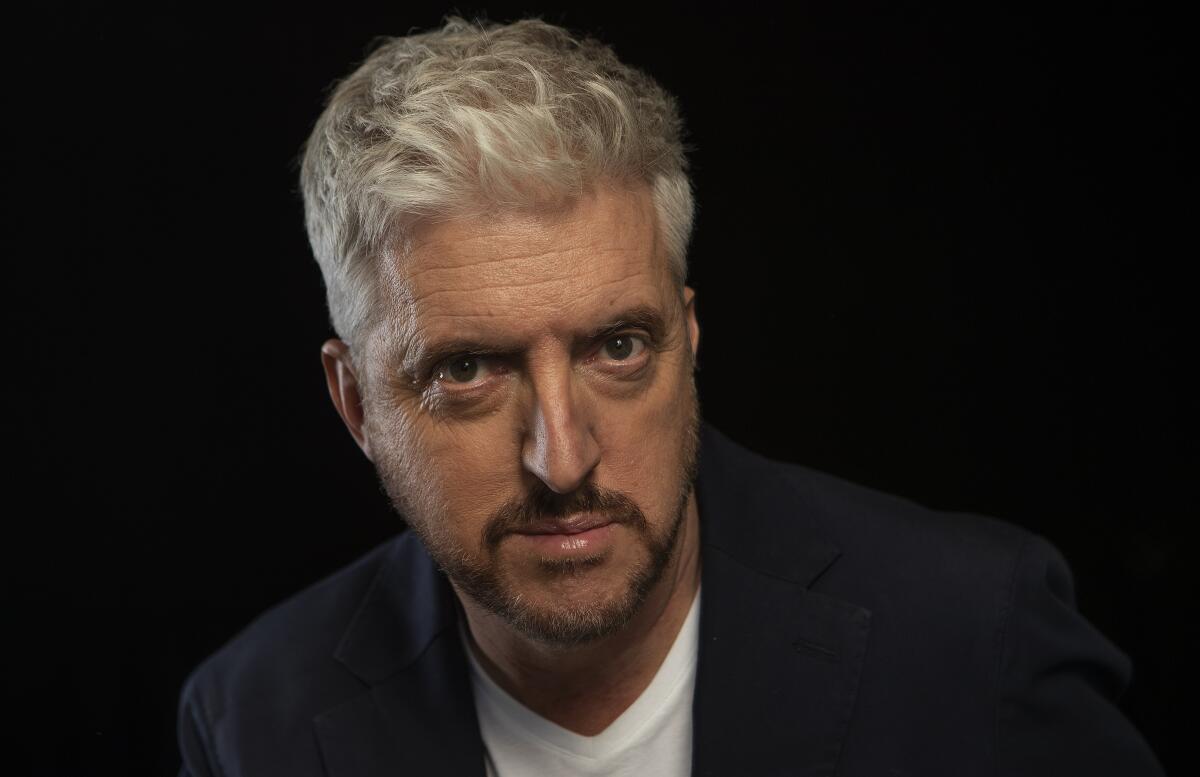The idea of two popes at once intrigued, but how to let each land a punch in their debate?

- Share via
I was in Rome, on vacation, when my sister texted and asked me to light a candle in a church for our cousin who had just passed away. I decided on St Peter’s cathedral, where, by happenstance, Pope Francis was giving an open-air Mass in the square. Struck by his charisma and international appeal, I started to think also of that other pope, Benedict, who I knew was sequestered in a monastery barely 100 yards from this place, a man who had renounced the papacy, the first in 700 years to do so.
I Googled when the last time the world had had two popes. From that search, the idea for a play, then film, then nonfiction book, emerged.
The greatest creative challenge posed by this project was speculating on what a debate between these two highly intelligent, principled but very different men — one a conservative German intellectual, the other a progressive Argentinian man-of-the-people — would look and sound like. Their respective positions on key issues are known through their many public statements, but how would their arguments be expressed in private and if directed at each other?
How to reconstitute their separate beliefs into live exchanges and heated arguments? How to make vivid the esoterica of this church, steeped in medievalisms and secret protocols? How to make dramatic the men’s rich and varied pasts, both having survived brutal dictatorships? And how to make all this interesting to a secular audience? The challenges were considerable, but I became evermore interested by the potential to create a passionate dialogue between a conservative and a progressive that might speak to the broader conversation raging in society at large about which of these two ideological camps best ensures our future.
As with any portrait of a real person, it’s vital that the finished product be one in which the subject of the portrait could recognize him or herself. To achieve this, the writer has to work within the parameters of historical record, inventing when necessary, honoring the facts as much as possible, distorting the facts never. It’s delicate work. You can invent too much, but you can also invent too little. Too much and you detach from the truth; too little and the work is dramatically DOA. Ultimately, you serve the truth — which isn’t the same thing as a pedantic enslavement to just what happened.
All history is imperfectly recorded and thus fallible. There must be sensitive invention, inspired speculation, all drawn from research, from the likely, the plausible, the emotionally authentic. Without such invention, it’s not art; it’s advertising.
The first order of business was to deeply research the terrain, one typically shrouded in secrecy and intrigue. How to begin? Firstly, I was raised in an intensely Catholic household, one of seven children, so many of the core themes here were familiar to me — I have lived some of them. I then read as widely as I could, translated many articles from both the German and Argentinian press. The internet is, of course, a valuable and deep resource. And then the writing phase begins. If not easier than the research phase, it was infinitely more fun.
It was important I didn’t write this debate from a particular point of view, promote a particular thesis or program. Rules as old as Plato dictate that a dramatist must love equally their characters, arm and equip opponents with arguments of equal power. Just as in a boxing match, pitting a flyweight against a heavyweight would be a mismatch not worth watching, so too a debate where one side lands all the best blows.
As ever with works based on true stories, the writing of dialogue is an act of ventriloquism. Francis was easier to impersonate, because my sympathies more naturally align with his. But it was in drawing Benedict that I learned the most, developed a surprising empathy for his conservative position, one that sees the dangers inherent in radical change, that all change brings with it its measure of destruction, and his conviction that the church that is married to the spirit of the age will be a widow in the next.
One thing that any organized religion must offer its followers is certainty — not doubt, not equivocation, not vacillation, but certainty — one unchanging eternal truth that everyone can navigate by; and it is for this that Benedict stood for. A factor that needed further explaining, however, was why this uber-traditionalist did the most untraditional thing imaginable: resign.
I came to see that Benedict’s resignation suggested a degree of change in him. Aware that Francis would most likely be his successor, I now think he knowingly stepped aside so as to allow change to happen. At some point I believe he made his peace with the idea of a Francis, with the need for change, and realized that the enforcement of rules is only of moral value if the rules remain worthy of enforcement.
More to Read
Only good movies
Get the Indie Focus newsletter, Mark Olsen's weekly guide to the world of cinema.
You may occasionally receive promotional content from the Los Angeles Times.








